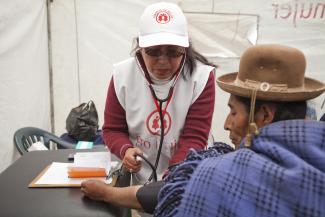Microinsurance
Healthy clients

The positive effects of microfinance are well-known. Small-scale financial services improve the income of generally disadvantaged people, especially women. Microfinance institutions (MFIs) enable them to invest in small businesses as well as to pay for social services and take care of their families.
Pro Mujer is an international women’s development organisation. It has developed a specific way of delivering microfinance services such as small loans, savings and insurance in combination with business training and empowerment. The NGO organises workshops that cover gender issues, domestic violence, communication and leadership skills. These workshops provide a safe and supportive environment for clients to build self-esteem and confidence. Furthermore, Pro Mujer provides high-quality primary healthcare coverage to its clients for little money.
Healthcare and microfinance are interrelated. Indeed, clients often use microcredits for health expenditures. Generally speaking, microfinance institutions (MFIs) should and could do more to improve poor people’s access to healthcare. Interesting options include:
- designing microcredits specifically for healthcare purposes,
- earmarking special savings accounts for healthcare costs,
- offering micro-insurance policies for health issues, or
- selling vouchers for pre-paid healthcare services, and helping clients finance the costs.
Micro-health insurance has boomed in recent years. Nonetheless, the approach is tricky. One reason is that insurances only make sense if the need is uncertain, and poor people normally shy from spending money on things they are not sure they will need. Insurances, moreover, pool risks of many people. Therefore, the scheme as such has to be large, even though premiums may be micro. Many MFIs, however, operate with small groups of clients. Unfortunately, many micro-insurances offer “micro” coverage for “macro” payments. MFIs are well advised, nonetheless, to add healthcare products to their services. Doing so can be a competitive advantage in an increasingly mature market. It would also fit MFIs’ social mission. The point is to design attractive products and achieve economies of scale.
Pro Mujer’s approach
MFIs are known to contribute to the empowerment of women. Most of Pro Mujer’s clients combine three characteristics: They are poor, female and entrepreneurs. Each factor affects their health status. Doña Juana is a “typical” example.
- Being poor, Juana had little knowledge of healthy lifestyle choices and good eating habits. She only used healthcare services when she was very ill, but not for preventive purposes. Over 60 % of Pro Mujer’s clients are overweight or obese. Diseases like diabetes, hypertension, arthritis or cancer are often diagnosed late, when cures are very expensive. Illness is the most likely reason for bankruptcy. At the same time, the cures are very costly for the public health system. Disabilities and premature deaths remain far too common among MFI clients.
- Being a woman, Juana will need gender-specific health services over the course of her life: contraception, prenatal and birth care and, perhaps, the diagnosis and treatment of sexually transmitted infections including HIV/Aids. She will need detection and, perhaps, treatment of cervical and breast cancers. Moreover, Juana is at high risk of domestic violence. Finally, she is likely to need money to cover health expenses for children. After all, women are responsible for raising kids in most societies.
- Being an entrepreneur, Juana “can’t afford to lose time”. Therefore, she sometimes prefers private health services to free public ones. To get a free ultrasound exam in the public system, Juana would have to go to the doctor three times. For each consultation, she would have to wait for several hours and pay for transport. A study by Pro Mujer estimated the economic loss per hour of not working for a woman in El Alto, Bolivia to be about $ 0.70. Considering that Juana would also have to pay for someone taking care of her business during her absence, she considers paying the equivalent of seven dollars for a private ultrasound “cheap”.
In view of great demand, MFIs should offer integrated health and microfinance services. Pro Mujer uses a “one-stop shop” approach. Its staff offer financial services, business training, empowerment advice and healthcare services to all clients. That is easy and convenient for clients, reducing the time they spend with Pro-Mujer staff. At the same time, this approach allows Pro Mujer to provide its services in an efficient and cost-effective manner. The NGO provides basic curative care for the client and her children, as well as preventive screenings for serious health problems. Unlike other public or private healthcare providers, Pro Mujer is in touch with women who are at high risk of disease. The NGO raises awareness and provides access to health services.
Currently, Pro Mujer’s health programme reaches more than 250,000 people in Argentina, Bolivia, Mexico, Nicaragua and Peru. Pro Mujer’s credit officers deliver basic health education, promote the use of healthcare services and sell high-impact healthcare packages. Without the microfinance platform, that number would be far smaller.
In Bolivia, over 60 of Pro Mujer’s centres do not only have rooms for bank operations. They also have rooms for group meetings as well as a fully equipped primary healthcare consultation room. As a result, about 80 % of more than 110,000 Bolivian clients receive basic screenings such as body mass indexing for obesity and blood pressure tests to detect hypertension. Over half of all clients have a clinical breast exam and over 25 % of them have a pap smear in any given year. Additionally, clients use health services for basic curative care for themselves and their children.
Future outlook
Pro Mujer in Bolivia is funding these services with revenues from its financial services (interest rates and commissions). This is simple in administrative terms. However, microfinance is becoming regulated more stringently in many countries, and the rules increasingly do not allow this approach.
Accordingly, Pro Mujer has developed a new, financially self-sustained health model. It was first launched in Nicaragua and was then expanded to Peru. The model provides universal access to health education and basic health screening services, as well as an optional healthcare package. It includes unlimited access to a physician, counselling, dental services, laboratory and cervical smears. It also features discount coupons for medical specialists, additional treatments and prescription drugs. On top of that, it includes some items that are not strictly health related such as coupons for grocery stores, gas for cooking stoves and even beauty salons.
Pro Mujer's savings and credit products help the clients to afford the service. Success depends on demand. Should too few women make use of the scheme, it would become unaffordable due to lacking economies of scale. Fortunately, clients’ responses in Nicaragua and Peru have been overwhelmingly positive. Pro Mujer has exceeded its sales target and reached sustainability by the end of the first year of operations.
Pro Mujer is thus successfully addressing some critical barriers to the effective use of health services: access, convenience, price and demand.
The NGO has yet to conduct studies on the impact on the health of adult women. It should not so much be measured in reducing prevalence or incidence of particular diseases, but in general measures such as DALYs (Disability Adjusted Life Years). One difficulty to do so on scale is the endless variety of microfinance services: those without health, with health education, with diverse health services and even more diverse modes of financing them.
Caroline Sölle de Hilari was the health and human development manager for Pro Mujer in Bolivia until July 2013. She would like to thank Gabriela Salvador of Pro Mujer International for her contributions to this essay. Sölle de Hilari recently joined Save the Children USA as the schools and health expert focussing on Latin America and the Caribbean. She is still based in La Paz, Boliva. chilari@savechildren.org














